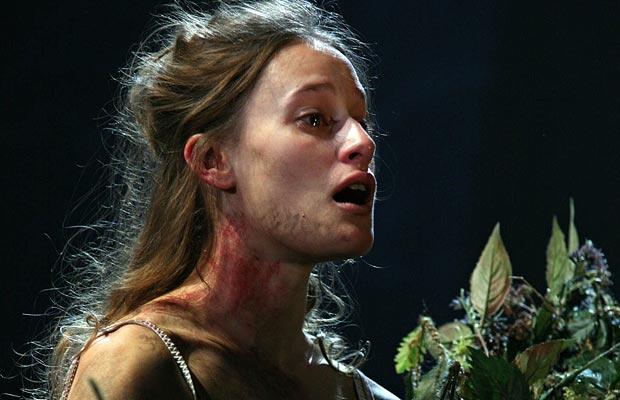Towards the end of his writing career Shakespeare was preoccupied with the themes of renewal, redemption, forgiveness, and in those last plays, The Tempest, The Winter’s Tale and Pericles, that renewal comes through the agency of a young female, in all three cases, a daughter.
The daughter in The Winter’s Tale is Perdita – her name is the Latin word for lost. The play is unusual in that the action starts and begins to develop and then stops. There is a sixteen-year time gap after which the action is resumed. Perdita is a baby in the first part of the play and a teenager in the second part.

Denise Mahler as Perdita
Perdita is born in a prison. Her parents, the king and queen of Sicily, have fallen out and the king, Leontes, has put his wife Hermione in prison. He has accused her of infidelity with his friend, Polixines, the king of Bohemia. Although she is innocent Leontes is unable to control his jealous rage. When the child is born he gives a servant orders for her to be taken to a remote place and abandoned. At one point the servant places her on a beach in Bohemia and when he looks up a bear is closing in on him. He runs away and Shakespeare’s most famous stage direction, ‘exit, pursued by a bear’ follows. He is eaten by the bear offstage.
A shepherd finds the baby and takes her home. He raises her in his family and she grows up to be a beautiful young woman. Untainted by court life, growing up in the country, she is pure and innocent. One day the royal prince, Florizel, son of Polixines, attends a sheep-shearing festival, sees the young shepherdess, who is the queen of the festival for the day, and falls in love with her. They plan to marry but the king refuses his permission and they decide to run away together to Sicily. Matters develop in Sicily and Perdita’s true identity is revealed. She brings all of the freshness of nature to the stale and stiff court, which releases new attitudes and results in forgiveness all around. The young people are married, the two kings are reconciled, Hermione, thought dead, is shown to be still alive, and Leontes is forgiven and redeemed.
Perdita is halfway between a primary and secondary character in The Winter’s Tale. She is a fully developed character and interesting mainly because of the way in which the two sides of her – the royal princess and the shepherdess – are expressed. She is conscious of the vast difference in rank between herself and Florizel and apprehensive about it but doesn’t fear it and won’t allow it to subdue her or dampen her love for Florizel. She is self-possessed: when Bohemia’s king, Polixines, calls her an enchantress and a low-class girl she holds back from responding, even though tempted to do so. Although she appears to be submissive, she consciously adopts that apparent submissiveness: she is strong rather than being naturally submissive. She is highly intelligent and confident enough to engage in debates with educated men.
Although she has been raised as a peasant Perdita’s noble heritage is not fully concealed beneath that. She does not approve of the crude language of the peasants around her, she is a graceful dancer, and looks like her mother, who is regarded as a classic beauty. She is comfortable in high society. All men who see her are stunned by her beauty and recognise real quality in her.

Mariah Gale as Ophelia
Top Perdita Quotes
O lady Fortune,
Stand you auspicious! (act 4, scene 4)
You’re welcome, sir.
Give me those flowers there, Dorcas. Reverend sirs,
For you there’s rosemary and rue; these keep
Seeming and savour all the winter long:
Grace and remembrance be to you both,
And welcome to our shearing! (act 4, scene 4)
Here’s flowers for you;
Hot lavender, mints, savoury, marjoram;
The marigold, that goes to bed wi’ the sun
And with him rises weeping: these are flowers
Of middle summer, and I think they are given
To men of middle age. (act 4, scene 4)
Take care: this dream of mine,—
Being now awake, I’ll queen it no inch farther,
But milk my ewes and weep. (act 4, scene 4)




Leave a Reply
Want to join the discussion?Feel free to contribute!